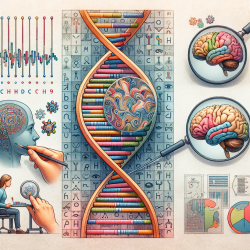Introduction
The recent research article titled "Epilepsy, cognitive deficits and neuroanatomy in males with ZDHHC9 mutations" provides significant insights into the intersection of genetics, epilepsy, and cognitive impairments. This study is crucial for speech and language pathologists aiming to enhance their practice through data-driven approaches. Understanding the implications of ZDHHC9 mutations can inform therapeutic strategies and improve outcomes for children with similar genetic profiles.
Key Findings
The study systematically investigates males with ZDHHC9 mutations, revealing a high prevalence of epilepsy and specific cognitive deficits. The research highlights:
- A significant association between ZDHHC9 mutations and epilepsy, particularly resembling rolandic epilepsy (RE).
- Distinct cognitive impairments in oromotor control, verbal fluency, and inhibitory control on visual attention tasks.
- Consistent neuroanatomical abnormalities, including reduced thalamic and striatal volumes and corpus callosum hypoplasia.
Implications for Practitioners
For practitioners, these findings underscore the importance of genetic screening and comprehensive neurocognitive assessments. Implementing these insights can lead to more targeted interventions:
- Early Identification: Genetic testing for ZDHHC9 mutations can help identify children at risk for epilepsy and cognitive impairments, allowing for early intervention.
- Customized Therapy: Understanding specific cognitive deficits enables speech and language pathologists to tailor therapy plans, focusing on oromotor control and verbal fluency.
- Interdisciplinary Collaboration: Collaboration with neurologists and geneticists can enhance the understanding of each child's unique needs and optimize treatment strategies.
Encouraging Further Research
This study opens avenues for further research into the biochemical and network-level mechanisms underlying ZDHHC9-associated phenotypes. Speech and language pathologists are encouraged to engage in or support research that explores:
- The long-term cognitive and linguistic outcomes in children with ZDHHC9 mutations.
- The efficacy of specific therapeutic interventions tailored to the cognitive profiles identified in this study.
- The potential for genetic therapies to mitigate the effects of ZDHHC9 mutations.
Conclusion
Understanding the role of ZDHHC9 mutations in cognitive and neurological development is crucial for advancing therapeutic approaches. By integrating genetic insights into practice, speech and language pathologists can significantly enhance the quality of care and outcomes for children. To read the original research paper, please follow this link: Epilepsy, cognitive deficits and neuroanatomy in males with ZDHHC9 mutations.










